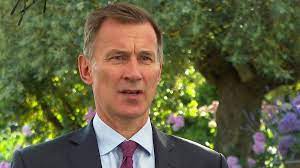UK has no alternative to interest rate rises: Hunt

London: The UK has “no alternative” but to hike interest rates in a bid to tackle rising prices, the chancellor has said.
Jeremy Hunt said inflation – the rate at which prices rise – was the “number one challenge we face”.
He said the government would be “unstinting in our support” for the Bank of England “to do what it takes” to slow inflation.
Rising interest rates and mortgage costs weighed on UK economic growth in April.
While the economy grew by 0.2%, the Office for National Statistics said that housebuilders and estate agents had a “poor month”.
Borrowing costs have been steadily rising since December 2021 to a current 4.5% in an attempt to slow consumer price inflation, which stands at 8.7%.
This is more than four times the Bank of England’s 2% inflation target.
In theory, raising interest rates means it is more expensive for people to borrow and they have less money to spend. Consequently, they will buy fewer things which should slow the rate of rising prices.
An increase in interest rates means higher monthly mortgage, credit card and loan payments for some people. Although higher rates should benefit savers – if banks pass it on to their customers.
Asked if he was following former Chancellor John Major’s dictum in 1989 that “if it isn’t hurting, it isn’t working”, Mr Hunt said: “In the end there is no alternative to bringing down inflation, if we want to see consumers spending, if we want to see businesses investing, if we want to see long-term growth and prosperity.
“We have to do everything we can as a government, as a country, to support the Bank of England in their mission to squeeze inflation out of the system.”
The government has no say over interest rates since the Bank of England was granted independence in 1997.
The Bank’s main responsibility is setting interest rates and keeping inflation at or near its target. It faces a balancing act as higher borrowing costs could hamper economic growth.
The UK economy expanded in April after shrinking by 0.3% in the previous month. For the three months to April, the UK economy grew marginally by 0.1%. The ONS said strong trade in bars and pubs boosted growth.
But it added that said the construction sector had faltered as rising interest rates and mortgage costs made house buyers more cautious. One housebuilder told the BBC people were “holding back” on buying homes.
As interest rates have risen and more people are coming to the end of fixed-rate mortgage deals, some lenders have been withdrawing certain mortgages from the market.
First-time buyers are being met with higher rates, leaving some priced out, and renters are also facing higher costs due to landlords selling up.
Ian Burns, who runs Cameron Homes in Staffordshire, said people were being “very cautious” and were “taking longer to make decisions”.
“Over the past three or four weeks, we’ve seen a slowdown in reservations and ultimately, if that doesn’t pick up, then we have to slow down the build operation,” he told BBC Wake up to Money.
“We can’t just continue to build houses if we don’t have customers for them.”
Guy Gittins, chief executive of Foxtons estate agents in London, said the “power balance” between buyers and sellers had “shifted”. He said this meant “serious sellers had to get a little bit more competitive with pricing”.
The Bank of England is widely expected to lift interest rates again when its Monetary Policy Committee meets next week.
But stronger than expected wage growth in the three months to April has raised the prospect that rates could rise close to 6% by the end of the year.
Yael Selfin, chief economist at accountancy firm KPMG UK. said “major challenges” remained for the UK economy.
She added it was likely the Bank of England would continue its rate hiking cycle “putting further pressure on both households and businesses as they face higher borrowing costs”.
Labour’s Shadow Chancellor Rachel Reeves said the figures represented “another day in the dismal low growth record book of this Conservative government”.
“The facts remain that families are feeling worse off, facing a soaring Tory mortgage penalty and we’re lagging behind on the global stage.”





